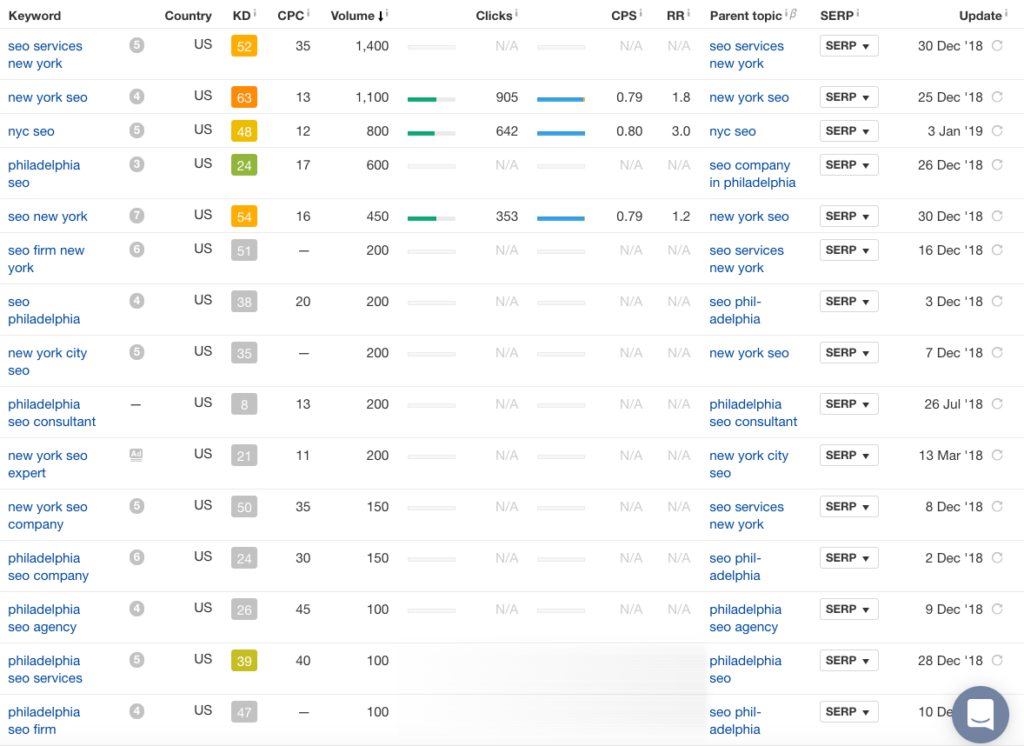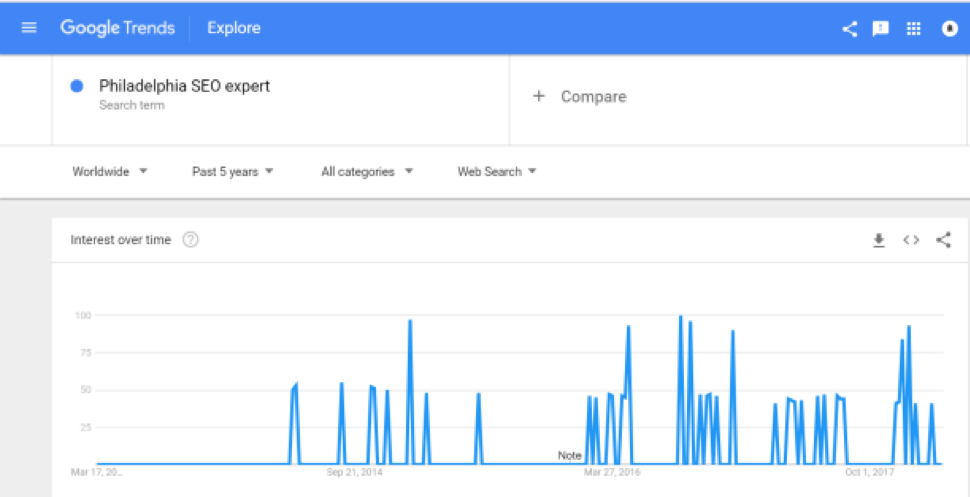Search engine optimization in Philadelphia is dominated by a few large agencies, with small companies doing the majority of work. The city is in the cross-hairs of both media and technology, and many Philadelphia SEO consultants know the “local” firms will continue moving onto a national stage. I’m known for expertise more outside the city than inside. Clickstream Solutions chooses to stay small. We’re choosy about clients we find synergy with for long-term partnerships.

2019 Update
According to Indeed.com, annual incomes for Digital Marketing and SEO positions are among the top salaries in Philadelphia, at approximately $63,600 per year. Companies that consistently list SEO-related job openings within the greater metro area are CMI Media and SEMrush (the USA branch of the Russian-owned company). CMI offers media services as well and focuses on the pharmaceutical and healthcare industries with more than 27-year experiences. CMI is currently filling over a dozen senior SEO and SEM positions based in Philadelphia. SEMrush is one of the world’s leading software companies for content marketing research. The company’s main offices and owners are based in St. Petersburg, Russia. They are currently advertising seven positions in Philadelphia, and have a staff of roughly 278 (I’m a SEMrush alum employee).
The most influential SEO agencies in Philadelphia include SEER Interactive, Will Reynold’s firm, and Digitas Health, a branch office of the well-known national brand. SEER is at roughly 150 employees if you count those small number also working in their new-ish office in San Diego. They currently list fourteen SEO and Digital Marketing job openings across the United States, eight of which are based in Philadelphia. Positions range from SEO Director – with a salary of $61,000-$95,000 – to Web Analytics Interns, with a salary of $36,000-$52,000.
DuckDuckGo, based in nearby Paoli, PA, announced it passed ten billion searches in 2017, with four billion occurring in 2016. DuckDuckGo describes itself as the search engine that does not make money off your private information without consent. In light of the recent outcry against Google’s use of private information, and concerns that they’re anti-competitive, the company has huge growth potential this year as an alternative search platform.
Keyword Volume, NYC vs. Philadelphia SEO
Philly remains a large hub for SEO services, with clickstream data from ahrefs proving useful comparisons to nearby cities. Keyword volume is 4x more accurate today than just four years ago. Software from companies like Moz and ahrefs no longer use variations of Google Keyword Planner numbers. Their data provide actual business intelligence since it is aggregated from chrome extension companies that sniff out website browser clicks (don’t worry, browser companies can not also track personal information with the click path data!)
The challenge here is clustering similar terms since people use different spellings for cities. Below are some useful numbers for the variants. Keyword-volume-as-business-intelligence also presents a challenge insofar as we don’t know enough about user search habits related to, for example, geography. Do people in NYC tend to look for search by services based on borough vs. broader research across the entire city?

Here’s a look at Google Trends data, showing a small increase over the past few years for Philadelphia SEO expert searches. However, given the small sample size Google Trends uses, this is not a great indicator for a lessor searched term.

SEO Related Events
This year, Digital Summit Philadelphia 2018 attracted many SEO specialists. Speakers at Digital Summit Philadelphia were influencers from different parts of the USA. The main speaker during the Search Engine Optimization course was Chris Countey, the Technical SEO Strategy Manager for Publicis Health Media in Philadelphia. Countey has over 12 years of SEO experience using Google AdWords, Google Analytics, web design and programming. This event provided plenty of insights for both beginner and intermediate-level SEO professionals.
Intermediate and advanced technical SEO consultants in Philadelphia have a chance to participate in a new technical SEO meetup group, “I’m From the Future” which is run by Callowhill, a digital marketing agency. According to I’m From the Future content strategist Matt Schickling, the meetup promises much more comprehensive and technical SEO material than blog posts or tutorials currently circulating on the internet.
June 2018 update
Philadelphia’s tech sector is set to expand dramatically with the opening of the Comcast Innovation and Technology Center. The city’s proximity to New York is a boon. Many overestimate the importance of Silicon Valley as the center of the digital revolution: They miss out on the importance of NYC in digital media growth.
The larger agencies in Phila, such as SEER Interactive, are already known nationally and internationally. Firms like Greenlane SEO and Trinity Insights are poised to benefit from the growing, close-knit digital media sector in the city. They contribute to the digital marketing community. Their prices may increase from these content marketing costs: you decide.
There are too many firms in the Philly still using old-school practices and pitches to attract and retain clients, so please don’t engage an expert who is all about guarantees of ranking. We all know SEO is the best bang for the buck, but measuring success requires deep data analysis experience.
2017 Update:
The typical Philly SEO consultant is on top of constant changes in how to help websites rank via outreach and understanding machine learning. The sector is smaller than in other cities, but there are more thought leaders here per person. Experts understand how to create content that hits the right creative and emotional buttons for people and the logical, structured outcomes that Google Search— a robot of sorts— uses for criteria.
Ranking high in Google was always about understanding the complexities of their algorithm vs. Google’s directive to just create good content. I’ve always thought it insulting that the search engine giants say an SEO pro should ignore their wizard behind the curtain: an algorithm. The Philadelphia Inquirer would never be so presumptuous as to say we can not influence what lies behind their curtain: journalists and editors. With AI and machine learning, Bing and Google step into a new era of evaluating “great content,” but these more accurate systems for ranking web pages still have tons of bias. Clickstream Solutions SEO experts use new principles so the logic of semantic relationships in content is thorough, complete, and holistic. The AI Google is using is not like a human editor judging an article for subtle, A+ creative writing.
I started this piece in 2012. Since then I’ve been lucky to meet many SEOs in the city through work at SEMrush and later through data-driven research using Google Search metrics. The SEO focus is so much about outreach today that many of the Philadelphia experts look almost like PR pros. PR folks not doing SEO seldom think of link equity, but should. It’s a KPI their clients may imagine only lives in the SEO silo. In fact, at an SEO Grail Meetup in Olde Town recently, I found people actually hiring PR professionals to do their content marketing outreach. Can you think of anyone with better media connections to get stories published in press or blogs? The other obvious trend people spoke about was how strong demand is for their services.
The folks that cry about SEO being dead display cluelessness. Consultants in the space today are very often the quarterbacks for other digital marketing, with social media experts, for example, taking their lead. Six years ago some of the most successful marketers were bridging the gap between digital and off-line advertising. Mid-way through 2017 there’s no excuse to still have a gap between the two. Now the emphasis is uniting other messaging between internal digital specialists. Link building guys (and gals) work with data “journalists.” This brings the statistics pros from U Penn together with the folks over at SEER interactive, for example. That’s one of the dozens of expertise areas that are coming together in Philadelphia.
Managing expectations between a Brotherly Love search engine optimization practitioner and a company that hires him is as challenging today as when the SEO industry was in its nascent stages. Signals affecting search ranking are even more complex today than ever, client expectations are often more demanding, and many independent SEOs manipulate realities, using the complexities to obfuscate whether tactics they employ are useful. Every week I meet someone that claims to be a Philadelphia SEO consultant and tells me there is a direct correlation between social media signals and search ranking. Wrong in 2018, and was never the case.
This week I was at an event at Table 31, at the bottom of the monolithic digital God of Philly, the Comcast building. Social media is part of a larger “content marketing” strategy. Links on Twitter, Linkedin, Facebook, and Google Plus have little to no value in bolstering the link juice/power that helps a website rank. Yes, Google will follow the links and they may help a webpage get ranked faster, but they don’t affect how high a page is ranked. Google plus shares and links result in more results but ONLY to the circlers and followers of the individual or brand that made the post.
The complexity of work done by SEO consultants makes prospective clients look for guarantees that are unrealistic. Two weeks ago at the Hard Rock café, Philadelphia I met the owner of a very successful test preparation business that would see a huge benefit from SEO work. We had a long discussion about a “pay per performance” model to pay for Internet marketing work.
I think the best analogy I made for him relates to how this kind of guarantee would work with a PR firm: Are they paid based on the quality and quality of news stories they are able to generate? Absolutely not. To do so would be to take on all the risk of a client’s marketing campaign. Agencies have enough risks in the way they operate. Results from PR campaigns are unpredictable. The bottom line is if a PR firm or SEO practitioner’s results are viewed over time, their base-line success should show measurable results.

